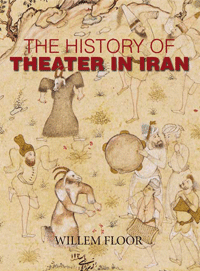
Mossadegh on stage
Review of a play, written and directed by Reza Allamehzadeh
February 6, 2006
iranian.com
For months, friends and family had sent me messages not to miss this performance. Having grown-up in a society that told me politics were none of a child’s business, my knowledge of the late Prime Minister Dr. Mossadegh and his achievements were limited to his role in nationalizing our oil, his prolonged – and sometimes faked – illness and the fact that he had followers who, according to the late Shah, had no right to do so. Considering the mystery that surrounded the man, it was only natural that I would be intrigued.
It was also natural that the play would start at 7:38 rather than 7:00 as scheduled and also natural that in a sold-out event, there would be several empty seats. But this is by no means going to reflect on how I received or what I have to say about the actual event.
The combination of film clips and live performance not only gave the play a more authentic feel, it brought back enough old memories to prepare the viewers for an emotional outlook. The play was to be presented in three acts, but multiple interruptions to signify time change made it hard to differentiate between them. I choose to discuss this upfront because it would be fair to review the play as two separate entities. Where the stage, lighting and music failed to promote the scenario, the content and a good performance more than made up for it.
The stage puzzled me. While its simplicity suited the main character, the three windows – stuck to the wall the entire time – became confusing. If they were to represent the three seasons, summer, fall and winter, then the similarity of light and color in the summer and fall murals did not serve that purpose and if they were simply windows, they did not belong to every scene.
 A common viewer with little knowledge of stage management, I would have liked to see one window per scene: A clear summer window for the first stage, a sad autumn for the second and a morbid winter for the third. I would have also liked not being left in the darkness for what seemed like an eternity while they changed the arrangement of few pieces of furniture. (I won’t even get into discussing the fact that the same furniture was used both in Europe and Ahmadabaad, or why Mosaddegh’s signature blanket – which used to be checkered – had changed into a plain one.) A common viewer with little knowledge of stage management, I would have liked to see one window per scene: A clear summer window for the first stage, a sad autumn for the second and a morbid winter for the third. I would have also liked not being left in the darkness for what seemed like an eternity while they changed the arrangement of few pieces of furniture. (I won’t even get into discussing the fact that the same furniture was used both in Europe and Ahmadabaad, or why Mosaddegh’s signature blanket – which used to be checkered – had changed into a plain one.)
The music left a lot to be desired, too. Although the selection happened to be some of my favorites both in classical and Persian, with the exception of a few instances, it did nothing to strengthen the scenes. In fact, as the prelude to Banan’s songs blasted and the spotlight enhanced the approach of Dr. Gholamhossein Mossadegh to the front of the stage, I almost expected him to break into a song!
All that set aside, the performances, especially that of Nasser Rahmaninejad as Dr. Mossadegh and Ali Pourtash as his son were outstanding. One also needs to consider the fact that to condense a long and meaningful life such as Dr. Mossadegh’s into two-hours’ performance is extremely hard if not impossible, let alone limiting it to a small stage and low budget.
The audience appeared to be divided into three groups. There were those who applauded mid-sentence, cheered and acted as if the actors were indeed actual characters proclaiming their beliefs. At the same time, I noticed a few elderly gentlemen who refused to applaud and did not return to their seats after the intermission. But most people seemed to appreciate the event and cheered the performers in the end with a standing ovation. I as one viewer felt richer for having seen the play and walked away with a stronger knowledge of an important episode in my country’s recent history.
About
Zohreh Khazai Ghahremani is a retired dentist and a freelance
writer. She lives in San Diego, California. Her latest book is "Sharik-e
Gham" (see excerpt).
Visit her site ZoesWordGarden.com
|